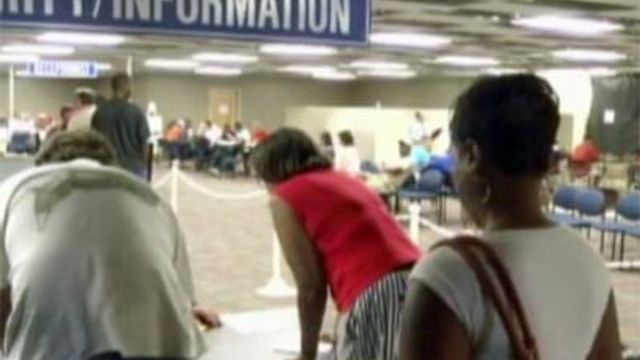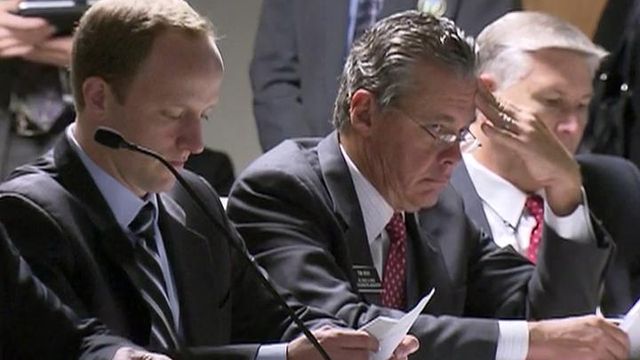Lawmakers propose fewer jobless benefits to repay insurance debt
Unemployed workers in North Carolina would see smaller benefits checks over fewer weeks under a proposal lawmakers unveiled Wednesday to repay $2.4 billion the state owes the federal government for jobless benefits assistance during the recession.
Posted — UpdatedThe state borrowed money from the U.S. Department of Labor during the depths of the recession, when benefits for idled workers far outstripped the money flowing into the state trust fund through unemployment insurance taxes paid by businesses.
North Carolina's unemployment debt is the third-highest in the country, behind only California and New York.
Companies next year will pay $84 per employee in federal unemployment taxes, with half of that going to debt repayment. Normally, the federal tax is $42 per employee to help operate North Carolina's unemployment system.
If the state takes no action, the amount of federal tax paid by companies will continue to rise until the debt is paid off in 2018, said Rodney Bizzell, a taxation expert in the General Assembly's Fiscal Research Division, told lawmakers.
To repay the debt by 2015 to save three years of charges, which legislators said could hinder North Carolina's economic recovery, they have drafted an overhaul of the state's unemployment insurance system to free up money for an accelerated payoff.
Under the proposal considered by the Revenue Laws Study Committee, a group of House and Senate lawmakers, the maximum weekly benefit for someone out of work would drop from $535 to $350. Officials say the new number is closer to the average paid by other states in the Southeast.
Also, the state would replace its 26 weeks of benefits with a system that adjusts the length of benefits to the health of North Carolina's economy. When unemployment rates spike, workers could get 13 to 20 weeks of benefits, but when the jobless rate is 5.5 percent or lower, benefits would range from five to 12 weeks.
The proposed cuts wouldn't affect people currently receiving unemployment benefits.
Employers also would have to pay a bit more into the state trust fund to pay off the debt and ensure the state doesn't wind up in similar straits in the future. The minimum unemployment insurance rate would rise from 0 percent to 0.6 percent, while the maximum rate would move from 5.7 to 5.76 percent.
About 20 percent of North Carolina employers pay no unemployment insurance and would have to start contributing to the system under the proposal, said Cindy Avrette, a legislative analyst for the General Assembly's Research Division. Another 10 percent pay the maximum rate, she said.
Other changes being proposed would make it more difficult for unemployed workers to get and keep jobless benefits, and no extended benefits would be paid out in a future recession unless the federal government picked up the tab.
Any legislation changing the unemployment system would have to be approved by the General Assembly when they reconvene next year. Rep. Julia Howard, R-Davie, co-chairwoman of the Revenue Laws Study Committee, said Tuesday that she expects lawmakers to take up a bill that is basically the same as what the committee looked at Wednesday.
Worker advocates complained that the proposed changes don't share the burden fairly. They say the state had to borrow money for benefits because employers weren't asked to pay enough into the trust fund.
"This proposal, if enacted, will require unemployed workers and their families to pay for them at a time when they have lost their job through no fault of their own and are struggling to make ends meet," Bill Rowe, director of advocacy at the left-leaning North Carolina Justice Center, said in a statement.
Rowe noted that North Carolina cut unemployment taxes when the state economy boomed in the 1990s.
But Gary Salomido, vice president for governmental affairs for the North Carolina Chamber, said cutting benefits would pay the debt down faster and save hundreds of millions of dollars in interest.
"No one thing caused the problem, and no one thing will get us out of the problem. We've got to all be in this together," Salomido said.
Bridget Birch of Raleigh said doesn't have as much to give as businesses, telling lawmakers that her family can't survive even on current unemployment benefit levels.
"I ask you humbly and with urgency to please not reduce the amount of benefits or the weeks that they're available," Birch said.
Sen. Thom Goolsby, R-New Hanover, defended the proposed changes.
"We've got to have a system that's solvent, that's well thought out, and we have to both give on each end – employers and the unemployed," Goolsby said.
"There will be plenty of time for debate and discussion, but we have to make the system solvent. Otherwise, we fail everybody in the state," committee co-chairman Se. Bob Rucho said.
Lawmakers considered refinancing the debt to pay off the federal government immediately and repay bondholders over several years at low interest rates, but Tony Solari, a policy adviser in the State Treasurer's Office, told them that course of action would be unwise.
Refinancing could save the state $100 million to $200 million in interest, but if another recession hit, the state would be unable to default on the bonds without harming its credit rating, Solari said. Also, taking "private debt" like employers' payments into the state trust fund and making it a public debt would raise questions in the financial markets about North Carolina's overall policies, he said.
Rucho, R-Mecklenburg, said the reforms will be one of the first issues taken up when the legislature reconvenes.
• Credits
Copyright 2024 by WRAL.com and the Associated Press. All rights reserved. This material may not be published, broadcast, rewritten or redistributed.






